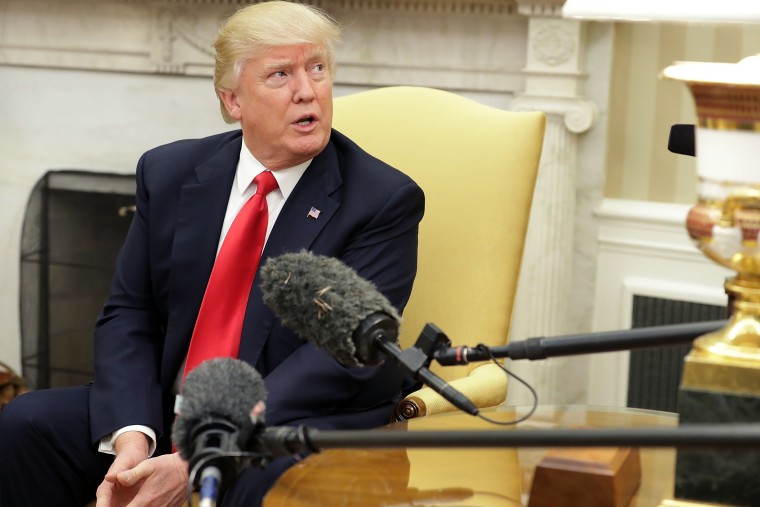On Saturday night, Donald Trump headlined a campaign rally in Illinois, where he reflected on the mass murder at a Pittsburgh synagogue earlier in the day. Fortunately, the president said all the right things.
"This evil, anti-Semitic attack is an assault on all of us," he said. "It's an assault on humanity. It will require all of us working together to extract the hateful poison of anti-Semitism from our world. This was an anti-Semitic attack at its worst. The scourge of anti-Semitism cannot be ignored, cannot be tolerated, and it cannot be allowed to continue."
That, however, was what the president had to say when he read from his trusted teleprompter. During an earlier Q&A with reporters, about an hour after the shooting, Trump was asked about the massacre and its connection to the nation's gun laws. He responded:
"Well, again, this has little to do with it if you take a look. If they had protection inside the results would have been far better. This is a dispute that will always exist I suspect. If they had some kind of a protection inside the temple, maybe it could have been a very much different situation. They didn't. And he was able to do things that unfortunately he shouldn't have been able to do."
Let's be clear about the context of these unscripted comments. The president was referring to what was apparently the deadliest anti-Semitic attack in American history. In the immediate aftermath of the horrific violence, one of Trump's first thoughts was to suggest the synagogue should've had armed guards.
He didn't explicitly blame the victims, but the implication wasn't subtle: in the president's mind, the onus was on the Tree of Life synagogue in Squirrel Hill to maintain armed security "inside" the house of worship, in preparation for a possible gunman. Trump felt it necessary to express his disappointment with what he saw as the temple's failure.
It wasn't a slip of the tongue. Trump added moments later, "This had been a case where if there were an armed guard inside the temple, they would have been able to stop them. Maybe there would have been nobody killed except for him, frankly."
It's eerily similar to the president's reaction to the mass shooting at the high school in Parkland, Fla.: if only there were more people with more guns, we would've seen better "results."
This, of course, is the precise message lobbyists for the gun industry want to hear. After all, selling more guns is the foundation of their business model. As such, houses of worship should hire people carrying guns to keep innocent people inside safe. And so should schools. And movie theaters. And concert venues.
In other words, Donald Trump's first instinct, in the wake of heartbreaking crime, was to peddle the line the NRA wanted him to repeat.
To be sure, if the president has internalized the gun lobby's talking points, it's up to the public to draw its own conclusions about Trump's judgment.
But let's make this plain: Americans can't have meaningful freedom of worship if they must be accompanied by armed guards inside their churches, synagogues, and temples.
